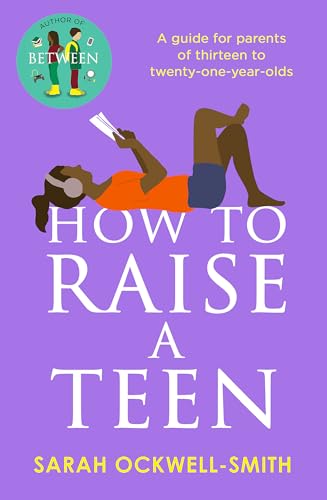How independent should a teenager be? There's no clear answer - but here are 7 expert tips to encourage it (while still keeping them close)
Research shows that the area where children are allowed to roam freely away from their home has shrunk by 90% since the 1970s


The teen years are a tricky time for parents, not just for the stereotypical attitude, reduced communication and arguments over screen time and homework, but because of the difficulty finding a balance between allowing independence versus keeping them safe.
Today’s teens are increasingly being raised by parents who used ‘snowplough parenting’ (where parents stand in front of their teens, ploughing a smooth path and clearing anything in their way) and helicopter parenting (where parents constantly hover over their teens, checking in on their every move). Despite this, 97% of parents believe that they are encouraging their teen’s independence, according to studies however, most realise that they themselves are the biggest obstacle to their teen actually achieving said independence. It seems that we are own worst enemies. We bemoan the fact that our teens cannot do anything independently, yet we struggle to give them the very freedom that breeds independence.
Shocking research has found that the area children are allowed to roam freely away from their home has shrunk by 90% since the 1970s. This applies not only to younger children, but teens too. While we may have had a decent amount of freedom as teens (albeit we probably thought our parents were too strict!), teens today are growing up with far less freedom and far more ‘cotton wool’ parenting.
I will freely admit to struggling with my own children (now young adults), and I think this worry is a sign of good parenting, at least parents who are good and want their best for their teens. Our desire to help and protect and keep our teens close however is often an obstacle to them developing the confidence and practical skills they need to fly in the world alone. One of my favourite parenting quotes is from the American Journalist and author Hodding Carter who famously said “There are but two lasting bequests we can hope to give our children. One of these is roots, the other, wings.” The trouble is, we do so well at growing roots and nurturing our children, that it can be hard to let go and give them the freedom they need to grow their wings."
How independent should a teenager be?
There is no right or wrong answer here, as all families are different and have varying rules and boundaries. However, if you clicked on this article then you're likely looking for some guidance, and I can share that with you. When writing my recent book How to Raise a Teen, I asked a sample of teens what they wish their parents did differently.
You’ll be pleased to hear that most were actually very complimentary about their parents and recognised that they were trying their best, even when they made mistakes. Most of the teens appreciated their parents’ support, love and nurturance too. When it came to change, the most common desire was for parents to trust them more. Several told me that they wished that their parents allowed them to make mistakes so that they could learn from them, and they also wished that their parents had more faith in them to make good decisions independently.

Raising a teenager can be challenging, exhausting and, at times, infuriating for parents. In this book, teen expert and mother of four young adults Sarah Ockwell-Smith provides guidance for parents, carers, and anybody else who works with teens and their families on how to navigate this tricky period.
Again, as a parent of young people, I can testify how hard this is. Of course, we have faith in our teens and want to trust them, we also know how tough the real world is and how much danger it presents, we know that a teen’s brain development sometimes means that they don’t make sensible choices. That said, there really is only one way for our teens to grow their independence, and that is to loosen the strings a little and learn to trust them. Perhaps the easiest way to do that is to trust ourselves and believe that we really have done a good job of parenting so far.
GoodtoKnow Newsletter
Parenting advice, hot topics, best buys and family finance tips delivered straight to your inbox.
How to allow your teen more independence - here are 7 small ways
- Show that you have faith in them
- Swap curfews for contact
- Let them make their own plans
- Let them organise something at home
- Trust them with money
- Have the difficult conversations about keeping safe
- Aim for Scaffolding
1. Show that you have faith in them
You’ve taught them well, now is the chance to let them put that teaching into practice and step back a little. Allow them to make mistakes and learn to rectify things alone, without you jumping in and always protecting them, or fixing things for them.
2. Swap curfews for contact
Rather than having a strict curfew, instead discuss a sensible time they could come home and ask them to keep in contact in plans change. Putting them in charge of their own sleep schedule and keeping you updated, rather than an arbitrary curfew time shows confidence and trust and the more of these you show, the more likely they are to act in the sensible ways you hope for.
3. Let them make their own plans
If you’re anything like me, after over a decade of parenting you probably have military level organisational skills. It can be tempting to step in and organise everything your teen does, however unless you let them take charge, they won’t learn to be independent. Yes, it can be painful watching them make haphazard plans, but the best way for them to learn is by the natural consequences of inappropriate planning. They won’t ever learn this if you step in every time.
4. Let them organise something at home
Maybe it’s planning one meal a week, shopping for ingredients and cooking it, or maybe it’s researching a weekend away for the family or planning a cinema trip. Whatever it is, allowing them to research, plan and organise shows huge faith in them and allows them to practice vital skills in the safety of home.

5. Trust them with money
If they’re not working and earning their own money, introduce an allowance as soon as possible. This money is theirs to spend on whatever they want; however they must also pay basics like travel to and from school or college, topping up mobile phone credit, haircuts and lunch money. Agree on what they have to cover (which will look different for each family) and plan the amount based upon your family’s finances. If they need extra money discuss ways they can earn more, perhaps by washing your car, mowing the lawn, selling their old clothes online, or pitching a stall at a car boot sale. Allowing them to practice budgeting and money skills while still living at home is a brilliant way to encourage financial literacy.
6. Have the difficult conversations about keeping safe
To keep them safe on the internet make sure they are aware of phishing scams, emails, messages and phone calls. Talk about grooming online (and offline), sexting, extortion, and the law surrounding sending and receiving explicit imagery if either party is under 18, county lines, alcohol, vaping and drugs, all with a focus on risk reduction, education and reiterating that they can come to you with any problem, at any time.
7. Aim for Scaffolding
Forget snowplough and helicopter parenting, the best style for any age, but particularly the teen years, is to view your support as building scaffolding around your teen. Providing them strong foundations and help when needed, but gently removing the scaffolding as they grow, little by little, until they can stand freely. If you remove a piece of scaffolding and they feel wobbly, then add that support straight back in again, but – like a game of Jenga – keep testing which parts you can remove with the main structure staying stable.
Main takeaway
I always say that part of the reason the teen years are so tough on parents, is because we’ve spent so long ‘holding on’ to our children. We’ve survived separation anxiety, clinginess, reluctant bedsharing, and the constant cries of “muuuummm” and “daaaaaddd” from young children who seem to need us every minute of every day. Now we have teens, we’ve gotten pretty good at dealing with the strong need for attachment, but now, in a flash, our children need completely the opposite from us. Learning to let go is a process and one that takes just as long to adjust to as allowing children to attach. It’s a huge transition for us as parents and one I don’t think we talk enough about in society.
Yes, your teen probably could be more independent and I suspect you’re in the 97% of parents who want that but cut yourself - and your teen - a break if they aren’t as independent as you hope just yet, the day will come when you become as good as growing wings as you are as growing roots and your teen soars off into the world alone.
If you liked this then check out Sarah's other great, and insightful articles all about navigating life with a teenager. The most recent on busting the myth that 'teenagers are lazy' will make you feel relief, and tips to get your teen to revise will make you realise it's not just you. Plus her insight into why teenagers never leave their room is hugely relatable - send to anyone in your life with a teen.

Sarah Ockwell-Smith is a mother of four young adults. She has a background in Psychology and clinical research and has also worked as an antenatal teacher and doula. Sarah has written fifteen childcare books, covering everything from newborns to teenagers, with a special emphasis on ‘gentle parenting’. Sarah regularly contributes to National TV and radio, including Good Morning Britain and BBC Radio 4 and 5, she has also written for national publications including The Guardian, The Express, The Daily Mail, The IPaper and The HuffPost. Sarah lives with her family, two rescue dogs, cats and chickens in North Essex. Sarah's newest book How to raise a teen is due to hit shelves July 4th 2024.